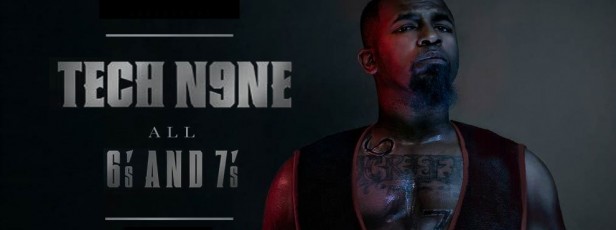In early June 2011, a rapper out of Kansas City named Tech N9ne came out with an album entitled “All 6’s and 7’s.” In its debut week, it sold over 55,000 copies, enough for it to enter in at number 4 on the Billboard 200 album charts, behind only Gaga, Adele, and the cast recording of the hit Broadway musical “The Book of Mormon.” What else was so great about it? As MTV’s website reported, Tech N9ne released the album independently, and had a strong fan base to thank for his success.
Tech N9ne, with the help of business partner Travis O’Guin, has, through their Strange Music label, released his own material independently through their Strange Music label since 1999, and has taken in about $15 million in the decade since. He says that he’s been getting calls from major labels even before his current album was released, but says he won’t be so quick to sign such a deal.
But is Tech N9ne really independent? It depends on how that meaning can be interpreted, because, on the one hand, Strange Music’s product is distributed through Fontana Distribution, an independent-level subsidiary of major-label Universal Music Group, which would put Tech and his label in bed with a major. [Sure enough, the slogan Fontana uses on its website reads, “Independent on a Major Level.”] On the other hand, if Strange Music were to own the master recordings, it would make them independent based on that standard.
By comparison, indie legend Ani DiFranco, whose Righteous Babe Records has, in the 20-plus years that her company’s been in existence, hasn’t (at least to the best of my knowledge), used a major-label’s indie-level subsidiary to distribute its product, which would make her company a “true independent.”
Yes, the definition of what constitutes an independent record label has been a rather tough one. Some organizations, like Nielsen SoundScan and co-owned publication Billboard, consider that if an indie is distributed by a major label, or by a company affiliated with such, then the label loses its independence. But that definition was disputed in a Billboard guest column by Rich Bengloff, head of the American Association of Independent Music [A2IM], who says that if the indie label retains ownership of the master recordings, it shouldn’t matter who handles its distribution.
Bengloff wrote that in 2010, if you counted ownership of master recordings, independent labels accounted for 30% of recorded music sales, both digital and hard-copy, in the US, as well as 37% of digital sales, numbers that would beat any one of the major labels.
Tech N9ne said to MTV’s website that he’s happy being an independent, and that if he wanted to sell his company to a major label, he joked that his aforementioned business partner, Travis O’Guin, would be asking for “around $900 million or something” to sign the rights away. That aside, If it’s true that Tech N9ne’s Strange Music owns the master recordings, and I hope they do, then he might have a point, because, aside from who distributes the product, it’s the ownership that should matter.
And in this Internet age, with all due respect to Tech N9ne’s efforts, as long as the artist owns the master recording, it shouldn’t have to necessarily use a major-label-backed middleman. That’s what doing it yourself is all about. True, DIY isn’t for everyone, and it can be hard work, but it can matter when it comes to that little thing called “pride of ownership.”
Do you think independent labels that distribute through a major can lose their independence even if the indie owns the master recordings?



